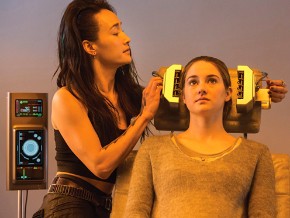Undaunted

Divergent is every adolescent’s dilemma magnified. Will Beatrice “Tris” Prior (Shailene Woodley) model her life on that of her parents or risk everything and strike out on her own? The core questions in this film are conventional: Who am I and where do I belong in the world? Yet Tris’s dilemma is universal, and Divergent illuminates an age-old question in a new setting.
The film is set in postapocalyptic Chicago in a society with the motto “faction before blood.” Each young person must make a public commitment to one of five factions that structure the society’s social life: Abnegation, Erudite, Dauntless, Amity, and Candor. Once made, the decision is irrevocable and determines the course of one’s life. Before they choose their factions, young people are given a neurological test that shows which faction best suits them.
When Tris takes the test, the woman administering it warns her to hide her results. “You’re different,” she tells Tris. “You don’t fit into a category. They can’t control you. They call it ‘divergent.’” Tris decides to join the Dauntless, which means leaving her parents, modest and self-effacing members of Abnegation who model modest dress and self-effacing values in service to society.




